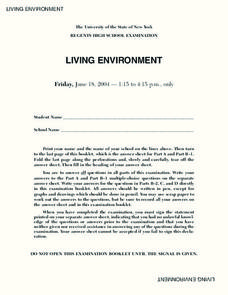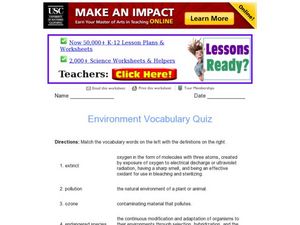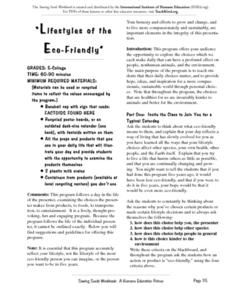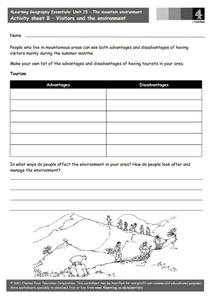Clean Up Australia
Why are Batteries Harmful to the Environment?
Open this lesson by reading together about primary and secondary batteries (such as nickel-cadmium cells), problems they can cause in the environment, and how humans can minimize the damage. Afterward, little ones examine a collection of...
Cornell University
Field Day: Be an IPM Detective
Become a pest detective! Individually or in small groups, scholars scout the land to discover which pests—plant and animal—inhabit it, determine whether the pests are endangering the environment, and summarize their findings.
NASA
Is It Alive?
Determining whether or not something is living can be more difficult than it seems. Put your young scientists to work defining their own criteria to identify life, then work with three samples to see if they are alive or not.
BBC
Walking with Dinosaurs
Breath new life into your class's study of dinosaurs with this extensive collection of materials. Offering everything from a printable T-rex mask, word searches, and connect-the-dots activities to informational handouts, hands-on...
Curated OER
Fitting In-Animals' Adaptations to Their Environment
In this animals' adaptation to their environment worksheet, students read for comprehension and ability to apply knowledge. In this T-Chart and creative activities worksheet, students answer three questions.
Curated OER
The right place to live
How do various plants survive in different environments? They adapt! Kids determine which plant traits make them perfect for their specific environment. They consider three plants and can even complete a plant experiment. Note: Intended...
Curated OER
Living Environment
For this environmental worksheet students complete a series of multiple choice and short answer questions on cell types, cell division, chromosomes and plant species.
American Physiological Society
What Environmental Conditions Lead to the Hatching of Brine Shrimp?
Will changing the environment in which brine shrimp live impact their reproductive success? Young scientists get hands-on experience studying the habitat of brine shrimp in a two-week immersion lesson. The teacher's guide provides all of...
Cornell University
Insect IPM
Find out the characteristics that makes a bug an insect with a workbook designed to inform scholars about the crawly creatures that live around us. Scholars complete an ant-themed word search, answer questions using a solution key, and...
McAuliffe-Shepard Discovery Center
Global Warming in a Jar
This well-organized lab activity introduces earth science pupils to the greenhouse effect. They will set up two experiments to monitor temperatures in an open jar, a closed jar, and a closed jar containing water. Ideally, you would have...
Sea World
Endangered Species
Study different endangered species with several activities that incorporate math, science, language arts, and research strategies. A great addition to your lesson on conservation or Earth Day.
Curated OER
Organisms and Their Environment
In this organisms and their environment worksheet, students will review concepts relating to ecological studies, levels of organization in ecology, and relationships between organisms in ecosystems. This worksheet has 10 fill in the...
Curated OER
How Do Environments Change?
In this environments worksheet, students will write in the effects fire, dams, and people can have on the environment. Students will complete 4 fill in the blank statements.
Curated OER
Environment Vocabulary Quiz
In this environment vocabulary worksheet, students draw lines to match 13 words to their definitions in another column. Words pertain to the environment. Examples: biosphere, habitat, greenhouse effect, smog.
Curated OER
Whose Home Is This?
After reading a short and informative paragraph on animals and their environments, learners look at pictures of four animals, and write a short description of how each one has adapted to its environment. A suggested activity is that each...
ARKive
Adaptation: Design a Species
Adapt is what an animal does to ensure it will survive in a specific environment; maybe it's more complicated than that. Your young animal experts can view this handy presentation to better understand animal adaptations and also complete...
Curated OER
Lifestyles of the Eco-Friendly
A helpful worksheet encourages pupils to make environmentally-friendly choices at home. The packet presents many ways that learners can help the environment, such as taking shorter showers in order to conserve water.
Curated OER
The Mountain Environment - Visitors and the Environment
In this geography and environment worksheet, students describe the advantages and disadvantages of having visitors in the mountains during the summer. They tell about how the environment is managed in the area that they live in.
Curated OER
Living and Nonliving Environments
For this ecosystem worksheet, students will distinguish between the abiotic factors and biotic factors shown in a diagram. Then students will correctly order the following: population, ecosystem, community, and organism.
Science Matters
Ecosystem Pre-Assessment
Test scholars' knowledge of ecosystems with a 20-question pre-assessment. Assessment challenges learners to answer multiple choice questions, read diagrams, and complete charts.
K12 Reader
Ecosystems
Examine how living and non-living things work together in a reading passage about ecosystems. Class members read the text and then respond to five response questions that relate specifically to the content of the passage.
Wilderness Classroom
Pollution
Educate scholars on pollution—air, water, and land—with a series of lessons that begin with a thorough explanation of each type. Learners then take part in three activities to reinforce the importance of reducing pollution. They...
Marine Institute
Water Pollution
Sixth graders investigate the various types of pollutants found in water and ways to help prevent water pollution. Through a hands-on experiment, students create samples of polluted water by mixing water with vegetable oil, dirt, and...
Curated OER
Our Earth Crossword Puzzle
In this earth's environment worksheet, students use the 20 clues and their problem solving skills to correctly complete the crossword puzzle.

























